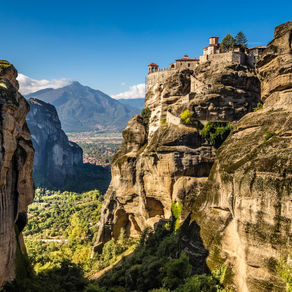Authors
George - The Shiny Greece Team (feat. ai)
Lesvos is home to an incredible wealth of cultural and historical sites, including some of the most impressive monasteries in Greece. From the Byzantine period to the modern day, these monasteries have played a vital role in the island's religious and cultural life, and their architecture reflects the changing trends and styles of the times. The wealth of religious monuments makes Lesvos a perfect destination for pilgrims.

Domes of Limonas Monastery | Photo by: iStock.com, CreativeNature_nl
Styles of Monastery Architecture Lesvos
Monuments of centuries – old ecclesiastic architecture and art, several churches and monasteries give testimony to Lesvos rich religious heritage. In this article, we take a closer look at the key features, styles, and design elements that make these buildings so unique and special.
Byzantine Style
The Byzantine Empire played a crucial role in the history of Lesvos, and its architectural influence can be seen in many of the island's monasteries. The Byzantine style is characterized by the use of domes, arches, and intricate mosaics, and is particularly evident in the Monastery of Taxiarchis Michail in Mantamados and the Monastery of Ipsilou in the western part of the island.

Moni Pammegiston Taxiarchon Mantamados Lesvos | Photo by: Chris Kar, Moni Pammegiston Taxiarchon Mantamadou (2) Lesvos, CC BY-SA 4.0
Venetian Style
Lesvos was occupied by the Venetians during the 15th century, and this period had a significant impact on the island's architecture. The Venetian style is characterized by the use of stone and brick, and is particularly evident in the Monastery of Agios Raphael in Thermi.
Ottoman Style
The Ottoman Empire ruled Lesvos for several centuries, and its architectural influence can be seen in many of the island's buildings, including the monasteries. The Ottoman style is characterized by the use of wood and plaster, and is particularly evident in the Monastery of Limonos in Kalloni.

Limonas Monastery Lesvos | Photo by: Tedmek, Lesvos Limonas012, marked as public domain, more details on Wikimedia Commons
Neoclassical Style
The Neoclassical period saw a revival of classical Greek architecture, and this style can be seen in some of the island's more modern monasteries. Neoclassical architecture is characterized by the use of columns, pediments, and symmetry.
Unique Features
Each of Lesvos' monasteries has its own unique features and design elements that reflect the cultural and historical influences of the island. For example, the Monastery of Ypsilou is built into the side of a mountain, while the Monastery of Taxiarchis Michail has a stunning array of frescoes that date back to the 15th century.

Ipsilou Monastery Lesvos Greece | Photo by: Tedmek, Lesvos Ipsilou02, marked as public domain, more details on Wikimedia Commons
A Lasting Impression
The Monastery Architecture of Lesvos is a testament to the island's rich cultural heritage and the diverse influences that have shaped its history. From the Byzantine period to the modern days, these monasteries offer a window into the past and a glimpse into the island's future. Whether you are a history buff or an architecture enthusiast, a visit to these magnificent buildings is sure to leave a lasting impression.





























































Monuments of the Byzantine and Post-Byzantine era, unique ecclesiastical architecture and art!